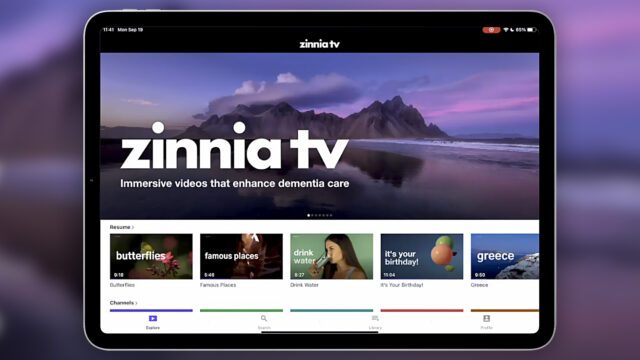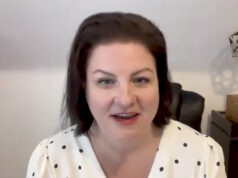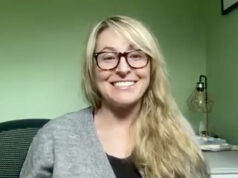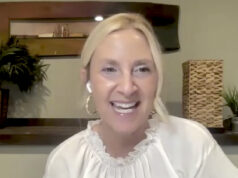Allyson Schrier joins Suzanne to talk about Zinnia TV, a therapeutic caregiving tool. It’s an app created especially for people in the progressive stage of Alzheimer’s or dementia.
So many caregivers are trying to do their best for their senior loved ones when their mind is working in a very different way. It’s an overwhelming situation. Allyson talks about the experience of caring for her husband who, after several years trying to find out what was going on, was diagnosed in 2012 with frontotemporal dementia at age 47, which has been in the news a lot lately, as Bruce Willis was recently diagnosed with it. Allyson’s kids were 12 and 15 at the time. It changed his personality, made him less connected to others and much different than the kind, loving husband he’d been. Regular TV and YouTube don’t engage well with those in middle or late stages of dementia. Allyson realized that slower-paced visuals, with music instead of words, or with the words captioned, would be better. Zinnia TV is co-founded by Allyson and Frank Lee, a former Product Designer at Apple.
Zinnia TV subscriptions are just $6.99/month, or $69.99/year, with a two-week free trial. Learn more at Zinnia TV.
Suzanne: And welcome, everyone, to Answers for Elders Radio Network, heard in 19 cities now across the USA. And we are so glad to have each and every one of you listening with us this weekend. And we’re going to talk about today a very important topic if you’re a family caregiver and you’re, you’re trying to manage days with a loved one and especially a loved one who has Alzheimer’s dementia that is in the progressive stage, life can be very harrowing. And there’s a lot of situations you have to think about. If you leave in room, there’s this anxiety of what’s going to happen. How can I keep my loved one calmer as their mind is working in a very different way. And so we are so honored this week to have the CEO of a brand new technology out there. And I am so excited to get an update with her, and that is Allyson Schrier and the name of your organization is called Zinnia TV. And welcome, Allyson, it’s so great to have you back on my show. For all of you, we do have some podcasts with her, but I really wanted to share Allyson with the U.S., and welcome.
Allyson Schrier: Thank you, Suzanne, it’s really great to be here.
Suzanne: Well, I’m glad you’re here because we talk about all the time. I swear so many caregivers are trying to do the best they can for their loved ones and they’re completely stressed out. Um, it’s so just overwhelming. I know that I had my mom that I took care of and she had vascular dementia. She wasn’t that far advanced, but even, even a little bit is something that you kind of have to be a watchdog over and obviously you came from a background as well to get into this world of Alzheimer’s dementia Allison. Would you share with us a little bit about your story?
Allyson Schrier: Sure, I’d be happy to. So I knew nothing about dementia when my husband was diagnosed at the age of 47 with something called frontotemporal dementia, which has been in the news a lot lately.
Suzanne: Yes, it has, I think that Bruce Willis has that.
Allyson Schrier: Yeah. And so my kids were 12 and 15 at the time and his diagnosed came after six years of really struggling to figure out like what is going on because he was just becoming increase increasingly strange. So, frontotemporal dementia has something, there’s the behavioral variant, which is what he had and that results in basically a person having a personality change where they start to become much more self interested, less connected to the people around them, more motivated by whatever it is that brings them joy. Yeah. So, so in other words, my very kind, sweet, sensitive, loving husband started turning into kind of a snotty teenager. And it’s really hard to get a diagnosis when the doctors that you’re visiting are looking for. Well, they wouldn’t think of dementia because there’s no memory, no frontotemporal dementia. And also he’s so young, right? I mean, he was 47. He was 41 when we started looking for answers.
And, you know, I think another problem is that many people with this particular variant of dementia don’t start by going to a G P necessarily or certainly not a neurologist, they start with like a therapist, you know, why? That I’m starting to feel a little bit different. And so that is not necessarily a world that’s really well versed in looking for um physiological reasons for changes such as, um,
Suzanne: Allyson, how long ago was this?
Allyson Schrier: This was in 2012, he received his diagnosis.
Suzanne: You know, it’s interesting because, since 2012 and today, 11 years later, they know a lot more and it’s been amazing how much more we know. But back then I’m sure you didn’t have the, the, you know, the knowledge more.
Allyson Schrier: In fact, we even went back to some of the doctors who had met with him early on and once we had a diagnosis and I was like, just so you know, I came to see you about, it turns out that he has something called frontotemporal dementia. And they were like, wow, what’s that? Really? Well, so I think that people know, do, do no more and that’s, um, one of the things that I guess we can talk about. But, but the work that I do these days, I work with the University of Washington with a group called the Memory and Brain Wellness Center. And the program that I’m involved in is specifically intended to create dementia expertise among primary and allied care providers. So, primary GPS, right, who should really know more about dementia? Like that’s why my work is about how do we educate this force of people to recognize that the thing that they’re looking at is actually dementia. And once you’ve made that determination, what do you do about it?
Suzanne: Well, and, and the thing that you’re saying is so true that there’s so many doctors out there that still know nothing. It’s amazing to me that the world has not done more and the more and more that I’ve learned about it, there’s all kinds of ways in which now we can even figure out now that if you have the capacity in your brain to develop Alzheimer’s dementia, they can catch it early and I didn’t even know this until recently. And most doctors don’t know this, which is incredible.
Allyson Schrier: Well, the emphasis certainly in the work that we do at the Memory and Brain Wellness Center is, is it’s all about early detection. How do we figure out early on that? Something has to start that will eventually become dementia because, of course, the stuff that’s going to become dementia in my brain is there for about 20 years before I become symptomatic. And so therefore, we know, like right now we reckon that probably about 30-40% of the people who have a dementia diagnosis have something that was probably preventable. So there are huge lifestyle changes that we can make that make it less likely that we will develop dementia in the first place or take that 20 years and, and turn it into 30 years, right? So that by the time I started becoming symptomatic, I am rather old and it’s something else that impacts me.
Suzanne: So, yeah, and then you developed this concept called Zinnia TV and just give us a brief overview what it is, and we’re going to talk about it more this hour.
Allyson Schrier: Yeah. Sure. So just maybe a little bit about the origin story. My husband lived in five different care communities and one of the things that was really challenging for me was that he spent a lot of time sitting in front of the television watching programming that was really not appropriate for somebody who can no longer tell fact from fiction, track a plot or process images and audio that are really intended for a person with a healthy brain. Right? So regular TV or YouTube streams are really not the right way to engage a person who’s living with especially mid- to late-stage dementia. So those things can result in agitation, confusion, daytime sleeping. And so I started just doing research. I just got curious, like what would be better for a person who’s living with dementia? And based on that research, I understood that programming that is slower paced, that is very visually appealing, maybe that has music instead of language, or if there is language, maybe that has the words written out so somebody can process them. So what I would do is, I would show up with my cell phone and I would use Apple’s Memories product to create little videos that I would show.
Suznne: Oh, I love that.
Allyson Schrier: But I was limited to whatever the photos were that were on my phone. And so I became curious — how would I have access to other photos? Show him a hockey video, for instance. So with a background in technology, I reached out just from some friends at Apple and they introduced me to the guy who was the lead designer for Apple’s Memories product. I told him my idea — couldn’t we create something that would be better for people who were living with dementia? And he totally got it. And great news for me, he had actually just left Apple and was looking for his next gig. So Frank and I joined forces and we created this company called Zinnia Technologies. And our first product is Zinnia TV.
Suzanne: Well, I am so interested and excited to learn more this hour about, you know, why does this, why is this such an amazing thing for those with dementia. But also even more importantly, for caregivers, I think that there’s a lot of people out there. I think right now, I’ve been told that we’ve got because of COVID, probably about 70 million family caregivers out there that are doing some sort of unpaid care in the US, and how many of them are stressed out and overwhelmed? And Allyson, you and I are going to talk about this a lot more in this hour and we’ll be right back right after this.













